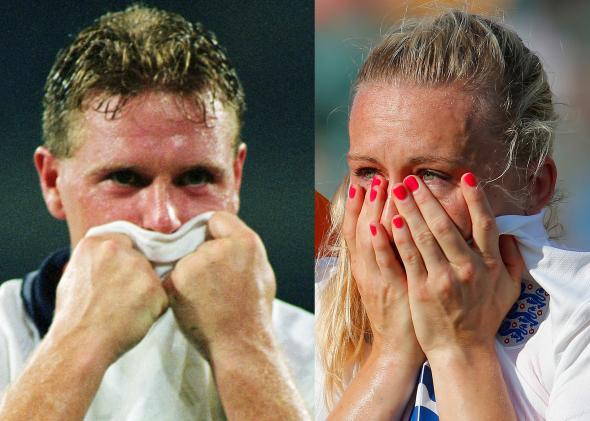England was eliminated from the Women’s World Cup after losing to Japan 2–1 on Wednesday in the most historically apt way possible for a country famous for tragic exits from major tournaments of its beloved national pastime. But the response to the nightmare end to a dream World Cup from England’s fans was heartening and offers a model for how fans should react to similar moments from athletes across genders.
In the second minute of injury time, just seconds away from the game going into two extra time periods, England defender Laura Bassett sent a looping clearance attempt in the direction of her goal and watched as it bounced off of the top bar and over the line to hand Japan the victory and a place in the Women’s World Cup final alongside the United States.
As the English press quickly noted, the heartbreaking circumstances of elimination for England’s women—who were making their first-ever World Cup semifinals appearance—are very much in line with recent experiences for their men’s team.
The BBC pointed out that Bassett’s despair and tears were reminiscent of England men’s star Paul Gascoigne at the 1990 World Cup after he got a yellow card in the semifinals that would have eliminated him from playing in the final. Gascoigne subsequently was too upset to take a penalty kick in the game’s final shootout, which England lost to Germany 4–3. His tears are one of the country’s most iconic sporting images.
The website Eurosport also catalogued England’s long history of late-game trauma in late rounds of major tournaments, bringing up penalty shootout losses in the 1996 European Championships, 1998 World Cup, and 2011 World Cup.
The English public and press, meanwhile, rallied around the England team, and even around Bassett, who received an outpouring of sympathy on Twitter from across the soccer world.
“Laura Bassett, without a shadow of doubt, will go home a hero but we will be there for her. We will stay together and stay strong,” said England coach Mark Sampson. “Laura is one of us, she is one of our team, we get around her, we console her and we tell her how proud we are of her, because without her we wouldn’t be in that semifinal.”
The hashtag #ProudofBassett even reportedly trended on Twitter after the own goal, while her teammates showered Bassett with support, one of whom described her as the nation’s “rock.”
“Laura Bassett feels like she has let everyone down but she has given everything for England,” goal-scorer Fara Williams said.
At least one writer, Claire Cohen of the Daily Telegraph, pointed out that the sympathy for Bassett might be part of a sexist double-standard—similar men’s soccer failures have resulted in players being broadly vilified and, in one tragic case, even killed.
But, as Cohen acknowledged, offering empathy for a player who had performed at the top of her game to help her team reach heights it never had before, but then made one bone-headed play that will haunt her the rest of her life, is the right approach for both women athletes and men.
